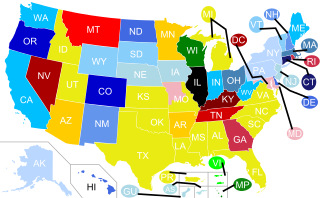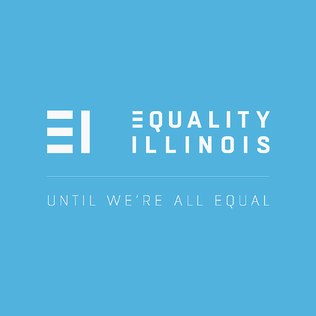
The Violent Crime Control and Law Enforcement Act of 1994, commonly referred to as the 1994 Crime Bill, or the Clinton Crime Bill, is an Act of Congress dealing with crime and law enforcement; it became law in 1994. It is the largest crime bill in the history of the United States and consisted of 356 pages that provided for 100,000 new police officers, $9.7 billion in funding for prisons which were designed with significant input from experienced police officers. Sponsored by U.S. Representative Jack Brooks of Texas, the bill was passed by Congress and signed into law by President Bill Clinton. Then-Senator Joe Biden of Delaware drafted the Senate version of the legislation in cooperation with the National Association of Police Organizations, also incorporating the Violence Against Women Act (VAWA) with Senator Orrin Hatch.

Megan's Law is the name for a federal law in the United States requiring law enforcement authorities to make information available to the public regarding registered sex offenders. Laws were created in response to the murder of Megan Kanka. Federal Megan's Law was enacted as a subsection of the Jacob Wetterling Crimes Against Children and Sexually Violent Offender Registration Act of 1994, which merely required sex offenders to register with local law enforcement. Since only a few states required registration prior to Megan's death, the state-level legislation to bring states in compliance—with both the registration requirement of Jacob Wetterling Act and community notification required by federal Megan's Law—were crafted simultaneously and are often referred to as "Megan's Laws" of individual states. Thus, the federal Megan's Law refers to community notification, whereas state-level "Megan's Law" may refer to both sex offender registration and community notification.

Sodomy laws in the United States, which outlawed a variety of sexual acts, were inherited from colonial laws in the 17th century. While they often targeted sexual acts between persons of the same sex, many statutes employed definitions broad enough to outlaw certain sexual acts between persons of different sexes, in some cases even including acts between married persons.
A sex offender is a person who has committed a sex crime. What constitutes a sex crime differs by culture and legal jurisdiction. The majority of convicted sex offenders have convictions for crimes of a sexual nature; however, some sex offenders have simply violated a law contained in a sexual category. Some of the serious crimes which usually result in a mandatory sex-offender classification are sexual assault, statutory rape, bestiality, child sexual abuse, incest, rape, and sexual imposition.

John Alden Fritchey IV is a former Democratic Cook County Commissioner of the Cook County Board of Commissioners who represented the 12th district in Chicago from 2010 until 2018 and was a Democratic State Representative in the Illinois House of Representatives, representing the 11th District in Chicago from 1997 to 2010. He additionally served as the elected Democratic Committeeman for Chicago's 32nd Ward from 2008-2012. According to the Arab-American Institute, Fritchey was one of the longest-serving Arab-American officials in the United States. He is presently President of F4 Consulting, Ltd. In 1998, he created the John Fritchey Youth Foundation, designed to create educational and recreational opportunities for local children through the sponsorship of academic and sports programs. He has additionally supported the Chicago Special Olympics as a repeated participant in the annual Polar Plunge. He presently serves on the Board of Directors of Chicago Gateway Green, a non-profit, public-private partnership dedicated to the greening and beautification of Chicago’s expressways, gateways and neighborhoods through landscape enhancement, litter and graffiti removal and the installation of public art.
Age of consent reform is an effort to change age of consent laws. Proposed reforms typically include raising, lowering, or abolishing the age of consent, applying close-in-age exemptions, changing penalties, or changing how cases are examined in court. A related issue is whether or not to enforce ages of consent on homosexual relationships that are different from those enforced on heterosexual relationships. Organized efforts have ranged from academic discussions to political petitions.
Laws regarding incest vary considerably between jurisdictions, and depend on the type of sexual activity and the nature of the family relationship of the parties involved, as well as the age and sex of the parties. Besides legal prohibitions, at least some forms of incest are also socially taboo or frowned upon in most cultures around the world.

In the United States, each state and territory sets the age of consent either by statute or the common law applies, and there are several federal statutes related to protecting minors from sexual predators. Depending on the jurisdiction, the legal age of consent is between 16 and 18. In some places, civil and criminal laws within the same state conflict with each other.
A sex offender registry is a system in various countries designed to allow government authorities to keep track of the activities of sex offenders, including those who have completed their criminal sentences. Sex offender registration is usually accompanied by residential address notification requirements. In many jurisdictions, registered sex offenders are subject to additional restrictions, including on housing. Those on parole or probation may be subject to restrictions that do not apply to other parolees or probationers. These may include restrictions on being in the presence of underage persons, living in proximity to a school or day care center, owning toys or items targeted towards children, or using the Internet. Sex offender registries exist in many English-speaking countries, including Australia, Canada, New Zealand, the United States, Trinidad and Tobago, Jamaica, South Africa, the United Kingdom, and the Republic of Ireland. The United States is the only country that allows public access to the sex offender registry; all other countries in the English-speaking world have sex offender registries only accessible by law enforcement.
A sexual predator is a person seen as obtaining or trying to obtain sexual contact with another person in a metaphorically "predatory" or abusive manner. Analogous to how a predator hunts down its prey, so the sexual predator is thought to "hunt" for his or her sex partners. People who commit sex crimes, such as rape or child sexual abuse, are commonly referred to as sexual predators, particularly in tabloid media or as a power phrase by politicians.
Child sexual abuse laws in the United States have been enacted as part of the nation's child protection policies.

Lesbian, gay, bisexual, and transgender (LGBT) persons in the U.S. state of Indiana enjoy most of the same rights as other people. Same-sex marriage has been legal in Indiana since October 6, 2014, when the U.S. Supreme Court refused to consider an appeal in the case of Baskin v. Bogan.

Equality Illinois (EI) was founded in 1991 to work towards building a better Illinois by advancing equal treatment and social justice through education, advocacy, and protection of the rights of the LGBT community.

The International Megan's Law to Prevent Child Exploitation and Other Sexual Crimes Through Advanced Notification of Traveling Sex Offenders is a federal law that requires, among other things, a visual "unique identifier" to be placed on the passports of registrants convicted of sex offenses involving a minor. The law also requires covered offenders to notify law enforcement 21 days before traveling abroad. Critics have claimed violation of constitutional rights and note that the law would also cover those who were convicted as minors.

The National Association for Rational Sexual Offense Laws (NARSOL) is an organization headquartered in Raleigh, North Carolina with operations based in Albuquerque, New Mexico and with affiliated organizations, advocates, and contacts in the vast majority of states. NARSOL and its affiliates are part of a movement to reform sexual offense laws in the United States. NARSOL has generated media attention by arranging national conferences in multiple cities including Boston, Albuquerque, Los Angeles Dallas, Atlanta, Cleveland, Houston, and Raleigh, and by being involved in numerous lawsuits challenging the constitutionality of sex offender registration and notification laws.

Women Against Registry (W.A.R.) is a U.S. non-profit organization, based in Arnold, Missouri, which works to obtain changes in laws affecting sex offenders. Most W.A.R. members are mothers, wives, girlfriends, and other family members of persons convicted of a sexual offense. W.A.R. advocates the abolition of sex offender registries altogether, but also wants officials to be more judicious in deciding who poses a risk, instead of the current policies applied to all offenders indiscriminately.

Criminal justice reform addresses structural issues in criminal justice systems such as racial profiling, police brutality, overcriminalization, mass incarceration, and recidivism. Reforms can take place at any point where the criminal justice system intervenes in citizens’ lives, including lawmaking, policing, sentencing and incarceration. Criminal justice reform can also address the collateral consequences of conviction, including disenfranchisement or lack of access to housing or employment, that may restrict the rights of individuals with criminal records.

Sex offender registries in the United States exist at both the federal and state levels. Registries contain information about persons convicted of sexual offenses for law enforcement and public notification purposes. All 50 states and the District of Columbia maintain sex offender registries that are open to the public via websites; most information on offenders is visible to the public. Public disclosure of offender information varies between the states depending on offenders' designated tier, which may also vary from state to state, or risk assessment result. According to NCMEC, as of 2016 there were 859,500 registered sex offenders in United States.

The movement to reform sex offender laws in the United States describes the efforts of individuals and organizations to change state laws requiring Sex offender registries in the United States. Efforts fall into two main categories, advocacy for reform of statutory rape laws that may require a teenager to register as a sex offender for consensual sexual acts involving a younger teen, and broader efforts to modify sex offender registration laws based upon their sometimes dramatic impact on a convicted sex offender and belief that they provide little benefit for public safety.

Alliance for Constitutional Sex Offense Laws (ACSOL) is a nonprofit civil rights, legal reform, and support organization, with offices in Los Angeles and Sacramento. ACSOL advocates for civil rights for those required to register as sex offenders, and their families. ACSOL was formerly known as California Reform Sex Offender Laws.









